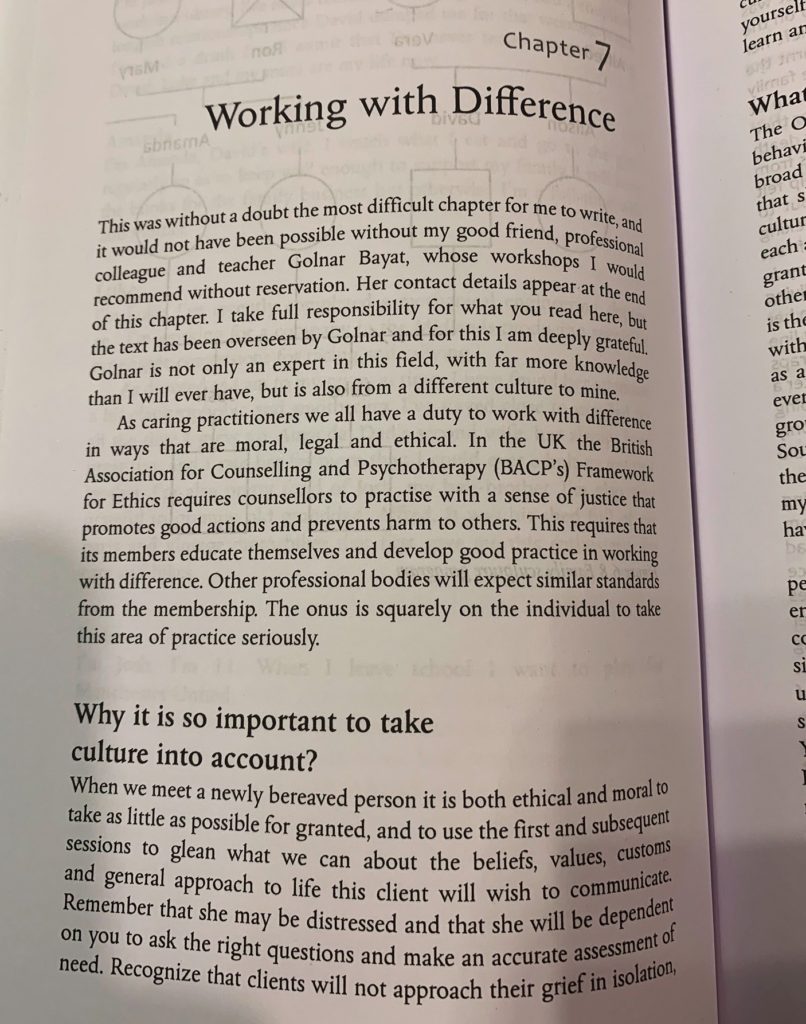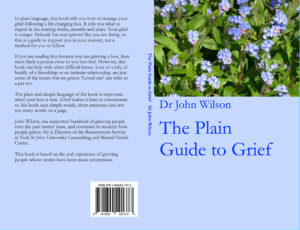I have been asked some questions about managing Covid-19 loss and grief. Based on my experience I have attempted to answer them as honestly and skilfully as I can.
Armrget asked that I mention the Black and Asian ethnic minority perspective on Covid-19 loss.
As a white male, I would never presume to speak for BAEM communities. However, as a teacher of counselling I do have an ethical duty to familiarise myself with the peculiar difficulties faced by those from cultures different to mine. In my first book, Chapter 7 is devoted to this. It was written with the help of a colleague from an ethnic minority; Golnat Bayat. She had control over the final edit.

Covid-19 has disproportionally affected Black, Asian and ethnic minority NHS staff. It has been suggested that institutional racism within the NHS has placed BAEM staff in the front line. This is something that in my view, a future enquiry must address.
The issue does not stop there. Hospital wards, mortuaries and funeral homes may not have received adequate guidance on the care of the dying and the dead in line with cultural and religious traditions. Even in awareness, the health and safety guidance for infection control has in many cases denied opportunities for religious ritual. Where that has been the case, counsellors working with clients of a different culture, have an ethical duty and professional responsibility to work in awareness of stress, trauma and guilt caused by unobserved cultural traditions in end-of-life care and funeral rituals. Counsellors will find detailed guidance in Chapter 7 of my first book.
There is a need for individuals to come forward and write about how their grief in Covid-19 bereavement is affected by their cultural tradition.
Saff asked “How do you reconnect with your feelings and with life?”
Saff, that emotional reconnection is part of the process of grief. The disconnection is your brain’s way of keeping your body safe from stress, until you are ready and able to deal with the reality. At your own speed, you will slowly reconnect with the world, although it’s seldom a smooth journey. You will have ups and downs. Sometimes you will feel that you are going backwards. A few people get stuck with the disconnection. Some use alcohol or drugs to stay disconnected. Some become workaholics or throw themselves into campaigning or supporting others before looking after their own needs. It takes courage to reconnect. Most people manage on their own, a few need counselling. There’s no time scale. For some it’s months, and for others, years.
Meieli asked about the nagging feeling of guilt from not being there when her Mum passed. She said, “I’d always promised her she wouldn’t die alone.”
That is such a difficult question Meieli, and my heart goes out to you in your guilt. Ultimately, only you can forgive yourself. It takes a special kind of friend to help you do that, because most people will, with the best of intentions, tell you not to be silly, that you did your best, and so on. I guess that isn’t what you need. You need people to stay with your guilt and support you through it. If you find the right counsellor, they will stay with you guilt and support you either to forgive yourself or to learn to live with the guilt. Counsellors have some skilled ways of helping you reach forgiveness, which include helping you hear and accept what your mother would say to you.
Anna asked two questions:
“How does one manage thoughts and feelings when you find yourself focusing on your own, and your family’s mortality and the fragility of life, and the hopelessness feeling that surrounds it?”
Thinking realistically about mortality and the fragility of life, is no bad thing. As a society, we don’t do half enough of it. I think it’s part of growing up to contemplate such things. My friends who work in palliative care live with death and dying every working day. Acutely aware of the fragility of life, they live their own lives to the full and overflow with compassion for others. What a gift to be given by those who have died. The hopelessness which for you is at the moment accompanying those thoughts, should fade. Like my answer to Saff, it’s probably a phase in your grief and it will pass in its own time. What doesn’t help is dwelling on hopelessness. If it becomes something you go over and over, again and again, in your own head, or as a family, that can lead to sleeplessness, anxiety and depression. If that becomes a prolonged difficulty, meditation CDs can help. You may need a counsellor that can guide you through meditation.
“How do you manage the feeling that you want to make big changes in your life when a loved one dies, because life’s too short.”
In some ways that relates to you recognising the fragility of life, so change might be good. However, I always say to clients contemplating change, “Don’t make any huge changes early on in your grief. The chances are that you’re not thinking straight, so you might regret them.” Also, a big change is both a stress and another loss of the life you knew before, so you would end up grieving that too. Acknowledge the feeling, discuss it with those you trust, but don’t act in haste.
Kat asked, “How do I deal those ‘friends’ who clearly don’t like me talking about my grief? If I try to bring up the subject of my parents’ death, they skirt round it. They change the subject and act like it hasn’t happened, when I need opportunities to talk about it. These friends leave me feeling like a burden Does their lack of acknowledgment mean they don’t care?”
It’s more likely to mean they don’t know how to help, rather than they don’t care. Of course, there will be some who prove not to be true friends, but equally, many people are surprised at those who were previously just acquaintances, but who know just what you need and are there for you. They become your true friends in adversity. It doesn’t mean that you have to ditch the friends who have disappointed you, they’re probably trying their best.
If and when you feel up to it you could try, straight out, telling them what you need; that you don’t need them to do anything to fix it, to make you feel better or come up with solutions. You could say that you just need people to be alongside you sometimes. People who show they will listen, and let you talk about your losses and the feeling that go with them. If you feel really brave and strong, you could tell them how you feel when they don’t listen, and when they try to change the subject. Don’t accuse or tell them that they make you feel. Say something like “when I try to talk about Mum and Dad’s death, I feel that you skirt round it, and that hurts. If they get defensive, be assertive. Say, “I’m not accusing you, or blaming you, I’m just trying to tell you honestly, how I feel when you seem to be avoiding the subject.” True friends will respond positively.
There is more in my second book
